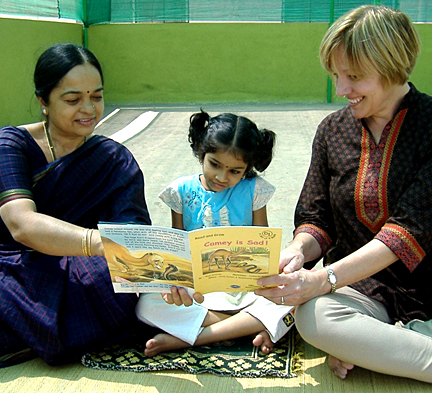“The children are too young to know English is a challenging language to learn; teachers help the preschoolers speak, read and write in English throughout the school day, and the children are thriving.”

Dr. Joan Kaderavek, right, and Dr. Prema Rao read with Navya Sajja at Blooming Buds in Mysore, India.
Dr. Joan Kaderavek, Distinguished University Professor of Early Childhood, Physical and Special Education in UT’s Judith Herb College of Education, is discussing experiences during her recent trip to India as a Fulbright Senior Fellow.
She and Dr. Prema Rao, head of the Department of Speech Language Sciences at the All India Institute of Speech and Hearing, worked together in January and February studying emergent literacy, the critical skills young children learn as the precursor to formal reading and writing.
The primary language in the region Kaderavek visited is called Kannada, but most children are multilingual, learning English, Hindi and other Indian languages at a young age, she said.
Working with Rao at a school called Blooming Buds in Mysore, India, Kaderavek noted that teachers typically taught children the more difficult aspects of the English language before teaching the “easier” English concepts.
“In the U.S., we teach consonants before vowels because we think vowels are harder to learn and ‘sound out.’ We teach printing before cursive writing because we view cursive writing as ‘more difficult.’ At Blooming Buds, teachers say, ‘A 4-year-old doesn’t yet know what is hard or easy, so let’s teach them the challenging lessons first, and then it will be easy for them to learn the rest,’” Kaderavek said.
In Kannada and Hindi, the smallest unit of language is the syllable, which means when putting chunks of language together to form words and sentences, the Indian language doesn’t present the same challenges as English, which is a language comprised of letters, she said. Consequently, children learn to read and write English first (since it is letter-based) and then the children are taught to read and write the “easier” syllable-based Kannada and Hindi languages.
Three and a half years prior to Kaderavek’s trip to India, Rao received a Fulbright Scholarship and spent several months at UT working with Kaderavek on emergent literacy techniques in the United States.
The two researchers read storybooks to children at Apple Tree Nursery School on UT’s Main Campus and evaluated how the children responded to readers with different accents or different physical appearances.
The pair repeated the research at Blooming Buds in India and are comparing the results to see if there are consistencies or differences across cultures in the way students acquire or fail to acquire the foundational skills of literacy.
At Apple Tree in 2006, for example, Kaderavek said students responded to her questions using fewer utterances but more complex sentences and ideas. They spoke more to Rao, but used simpler phrases.
“When we analyze the data of the responses from Blooming Buds, it will be interesting to see what patterns emerge,” Kaderavek said.
There are other differences in emergent literacy experiences in U.S. and Indian homes. In the United States, adult-child book reading is a strong cultural practice for many families. In contrast, Kaderavek said that India has a strong cultural tradition of oral storytelling. Oral storytelling fits more easily into a home where a great deal of housework and cooking occurs daily; it is a feature of home life in India.
Rao and Kaderavek agree that they would like to see adult-child book reading added to the daily lives of children in India. There are certain language features that are characteristic of written language that occur infrequently during oral storytelling. For example, written language uses past tense verbs and dialogue carriers (“The boy yelled ‘Watch out!”’). Exposure to storybooks during the preschool years helps build foundational skills needed for reading development.
In addition to continuing her teaching load at UT during her time away — via distance learning — Kaderavek gave a series of lectures to education faculty and students across the country. Kaderavek recalled that one lecture was broadcast to 12 schools across India. At one of the broadcast sites, the students were bundled up because they were in the Himalayan Mountains.
Named for Sen. J. William Fulbright of Arkansas, the Fulbright Program was established in 1946 to promote “mutual understanding between the people of the United States and the people of other countries of the world,” according to the program’s Web site. The exchange of professors to learn and teach in other nations and cultures is key to that mission.